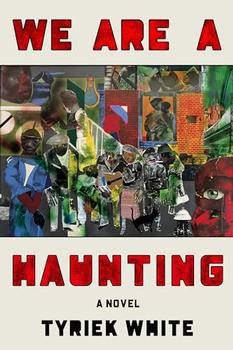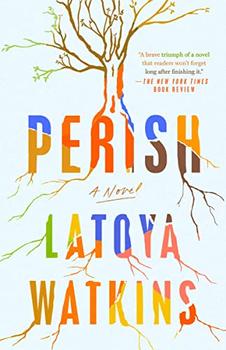Summary | Excerpt | Reviews | Beyond the book | Read-Alikes | Genres & Themes | Author Bio

A Novel
by Tyriek WhiteA resonant story about a black family in Brooklyn, We Are a Haunting opens with adolescent son Colly mourning his mother Key, who has died of cancer. Colly chats with his mother as if she is still alive and the conversations chain him to the life he once had. The rest of the family is similarly bereaved. Colly's grandmother Audrey is struggling to manage her own memories of her daughter while staying afloat financially. His father is barely there, a somber outline in a chair. His stubborn sister Toya spends as much time as possible at Nana's (Audrey's) instead of home with her father. Author Tyriek White invites the reader to absorb a family in trauma and to luxuriate in the Brooklyn of their lives: Gersh Park, Broadway Junction, the 3 train, Stanley Avenue.
Of the three timelines that saturate the story — 1988 when Key begins her career as a doula (see Beyond the Book), 2007 when Key dies, and 2016 when college-educated Colly returns to the city that raised him — I was especially fascinated by the late 80s, when AIDS is rampant in New York and Key, in her caretaking role, shows tireless stewardship for the pregnant and vulnerable. She thrives in this role while also making note of how it is part of the history she comes from to soothe the discriminated-against helpless: "We have been just like this for centuries, boiling water, laying out rags, soothing a young girl with coos and whispers, all the while at the helm of a war being waged against their existence."
That there are women like Key who know what they are doing in the delivery room is remarked on by a nurse, as if below-standard care is the acceptable norm. But Key is more than a doula. Ample chapters are devoted to her supernatural gift for listening to the dead, which she makes use of even as it leaves a mark upon her. The experience is bruising: "I taste blood…I hear water, first the slow wash of a tide, then rushing, as if caught in a heavy stream that keeps pulling me under. There are voices, pulsing from beneath the water, some wall I can't see."
After Key's death, an acutely afflicted Colly repeatedly touches his emotional wound. I felt within him a sense of having been betrayed by those who had left him, and give White credit for showing the particular sensitivity of an adolescent boy. Colly's mother's absence doesn't paralyze his youth or precocious artistry. He channels his pain and expresses himself in ordinary ways. Laughter and fun with close friend Zaire. Romantic fantasies of Naima, who lives on the Upper East Side.
"You didn't belong here," Colly says to his mother's ghost. "You spoke too frankly, laughed too earnestly, and felt too deeply. You opened yourself up to the world like a pomegranate." In the times that we see her alive, it is her openness that allows Key to dream of and speak to the dead. She asks, "Do the dead still have a right to this world?," which reminded me of a line from the Toni Morrison novel Song of Solomon: "You can't just fly on off and leave a body." While Morrison's imagery of body-as-freight is powerful, so is the way White takes on the difficult task of normalizing the supernatural for those who are skeptical of such things.
One profound experience in Key's life occurs when a woman named Stephanie beckons her. Stephanie's mother, Rosa, died in a candle fire and she is bereft in the aftermath. Key obliges her request to speak with the dead and the story slips back into ancestral time. White, to his credit, avoids the various Catholic and Protestant tropes focusing on the physical presence of God or His mythological wrath. Instead, there is dispensation for those who have died, and for the people who see them there is grace.
When Key has been dead for a year, Colly is at a party with college students, and he overhears someone talking about how trauma can leave a chemical mark in a person's genes and be passed down generationally. Trauma begets trauma. Sadness 30 years earlier is sadness today. It's a powerful idea that White traverses. Key, the good mother, is sensitized to the trauma of the dead. Colly, the kind son, is sensitized to the trauma of his mother. Absence can be pathological. It's less about being cursed and more about being damaged in your cells. It is upon the living to endure the cumulative absences of those who have loved us dearly but are gone in an instant.
![]() This review was originally published in The BookBrowse Review in May 2023, and has been updated for the
May 2024 edition.
Click here to go to this issue.
This review was originally published in The BookBrowse Review in May 2023, and has been updated for the
May 2024 edition.
Click here to go to this issue.

If you liked We Are a Haunting, try these:

by Jacqueline Woodson
Published 2025
Winner: BookBrowse YA Book Award 2023
National Book Award winner Jacqueline Woodson brings readers a powerful story that delves deeply into life's burning questions about time and memory and what we take with us into the future.

by LaToya Watkins
Published 2023
From a stunning new voice, comes a powerful debut novel, Perish, about a Black Texan family, exploring the effects of inherited trauma and intergenerational violence as the family comes together to say goodbye to their matriarch on her deathbed.




A book is one of the most patient of all man's inventions.
Click Here to find out who said this, as well as discovering other famous literary quotes!
Your guide toexceptional books
BookBrowse seeks out and recommends the best in contemporary fiction and nonfiction—books that not only engage and entertain but also deepen our understanding of ourselves and the world around us.